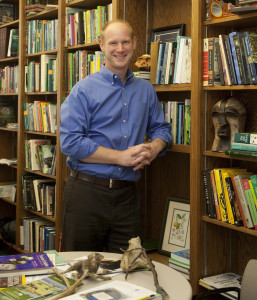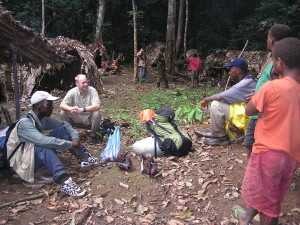
We’ve all got to eat. And, the location, preparation and consumption of food is a central part of the existence of all living things.
Nathaniel Dominy, associate professor of Anthropology at Dartmouth College, focuses his research on an evolutionary understanding of how humans and primates eat.
Nathaniel J. Dominy received a BA from Johns Hopkins University in 1998 and a PhD from the University of Hong Kong in 2001. His post-doctoral training at the University of Chicago (2002-2004) was supported by an NIH National Service Research Award. He is presently an Associate Professor in the Departments of Anthropology and Biological Sciences at Dartmouth College. Professor Dominy’s research is focused on primate feeding behavior and evolution. He has been awarded Fellowships from the David and Lucile Packard Foundation and the Council for American Overseas Research Centers. He is an Elected Fellow of the Explorer’s Club and he was named a “Brilliant 10” scientist under the age of 40 by Popular Science magazine. Professor Dominy lives in Norwich, Vermont with his wife and two children.
Dr. Nathaniel Dominy – Edible Environments
As a biological anthropologist and an evolutionary biologist, my research is usually focused on humans and nonhuman primates, but I have broad interests in how all animals discern and acquire edible objects in their environments.
Most living organisms are averse to being eaten, so the process of detecting, capturing and assimilating food can be challenging. One of my central motivations is to quantify this challenge; that is, to measure the properties of food objects that could have exerted a strong selective pressure on the consumer, and thus account for the evolution of novel anatomical and behavioral attributes.
The idea that food is crucial to survival and reproduction – after all, we all need to eat – underpins my approach to studying human evolution. I believe that many or most of the classic hallmarks of human evolution – from the origins of color vision to the evolution of bipedalism, tool-use, complex cognition, and language – are linked directly to the daily task of finding and consuming food.
A problem is that the evolution of the human lineage was a qualitatively unique event. We don’t have the benefit of a recurring pattern in other lineages, so it is difficult to use an approach called the comparative method. For example, no other animal controls fire for the purpose of cooking food. So, to study when, how, and why humans started cooking we must look for direct evidence in the archeological record or make reasoned inferences based on the physical and nutritional effects of open-fire cooking on wild plant foods.
My most memorable study was with Hadza hunter-gatherers in Tanzania. My goal was to study the effects of roasting on the mechanical properties of large tubers. Perhaps not surprisingly, roasting softened the tuber, making it much easier to chew. This simple result is consistent with the idea that cooking can explain the origin of radical anatomical changes in early Homo, such as smaller jaws and teeth together with a larger brain and body. Of course, I would prefer a time machine to know whether our early ancestors cooked their food, but in the meantime fieldwork in remote and beautiful places will have to do.

